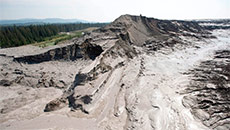CALGARY — Mad cow disease has been confirmed in a beef cow on an Alberta farm, but the federal agriculture minister says the discovery won't affect Canada's international beef trade.
"We have a very fulsome testing procedure. We don't change from our controlled risk status ... so we don't see this interfering with any of our trade corridors at this time," Gerry Ritz said Friday after the Canadian Food Inspection Agency confirmed the case.
Canada works under international protocols that allow for up to a dozen cases a year of bovine spongiform encephalopathy, or BSE, Ritz said.
"We have stayed well below that."
Alberta did initial testing on the cow and Ottawa was informed a few days ago, Ritz said. The CFIA followed up with further tests.
The agency said no part of the animal's carcass entered the human food or animal feed systems.
It's the first case to be reported in Canada since 2011.
Ritz said the infected animal was not born on the farm where it was discovered. The CFIA said it is still trying to determine the cow's history and how it became infected.
"The investigation will focus in on the feed supplied to this animal during the first year of its life," the agency said in a release. "The agency will also trace out all animals of equivalent risk. Equivalent risk animals will be ordered destroyed and tested for BSE."
It says Canada continues to be designated a "controlled BSE risk" country by the World Organisation for Animal Health.
Doug Gillespie, president of the Saskatchewan Stock Growers Association, said the new case isn't surprising.
"They expect to find one of these from time to time ... It really shows our system is working, that beef is safe. It really never reached the food chain or anything," he said from his farm near Swift Current, Sask.
"Of course there's always concern, but we'll see where it goes from here."
BSE is a fatal and untreatable wasting disease of the brain and nervous systems and is caused by rogue proteins called prions.
Humans who eat infected beef can develop a fatal disease called variant Creutzfeldt-Jakob disease. Fewer than 250 human cases have been reported worldwide.
Canada's first known case was discovered in 1993 in a cow from a farm near Red Deer, Alta. The animal had been imported from Britain.
The first instance of BSE in a Canadian-born beef cow was in May 2003. It's suspected that animal became infected through contaminated animal feed that contained a protein supplement made with ground meat and bone meal.
The first home-grown case of BSE devastated Canada's beef industry. About 40 markets immediately closed their borders to Canadian cattle and beef products, although many of those markets have since reopened.
Testing of cattle was strengthened following the mad cow crisis and specified risk materials, such as brains and spinal columns, were banned for use in feed and other products.





